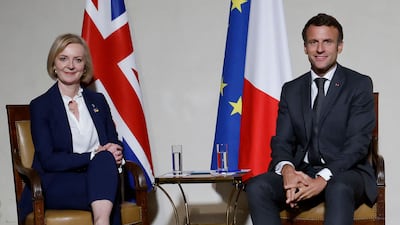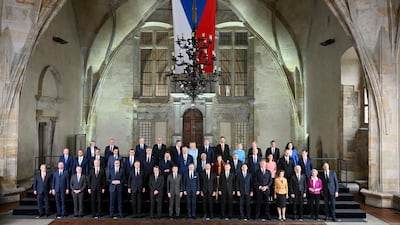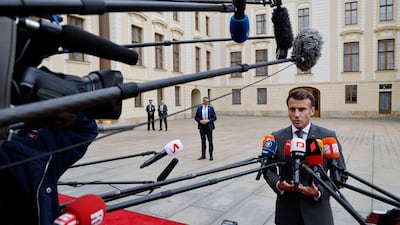The UK and France will work together more closely to tackle the migration crisis gripping both countries, British Prime Minister Liz Truss and French President Emmanuel Macron said during a meeting on Thursday.
The pair met outside the first summit of the European Political Community summit in Prague, a gathering for which Mr Macron pushed hard.
They said they looked forward to “an ambitious package of measures this autumn” to address migration across the English Channel.
And in a sign that Ms Truss hopes to improve relations with Mr Macron, she had no hesitation in calling him a “friend”, just weeks after refusing to do so.
The then British foreign secretary was widely criticised after she declined to say whether Mr Macron was a “friend or foe” when asked during the Conservative Party leadership contest.
Mr Macron later said it was a “problem” if Britain could not call itself a friend of France.
But as Prime Minister, Ms Truss adopted a different tone before the meeting.
“I work very, very closely with President Macron and the French government, and what we’re talking about is how the UK and France can work more closely together to build more nuclear power stations and to make sure that both countries have energy security in the future," she said.
“We’re both very clear the foe is [Russian President] Vladimir Putin, who has through his appalling war in Ukraine threatened freedom and democracy in Europe and pushed up energy prices which we’re now all having to deal with.”
Asked about Mr Macron's status with Britain, Ms Truss replied: “He is a friend.”
The meeting between the two leaders, which took place towards the end of the day, appeared to show some progress on the issues of migration and energy, which she had raised as priorities before the summit.
It also emerged that the two countries have agreed to hold a joint summit next year to “take forward a renewed bilateral agenda”, in a further sign of the desire for warmer relations.
“They further agreed to deepen co-operation on illegal migration within the bounds of international law, to tackle criminal groups trafficking people across Europe, ending in dangerous journeys across the Channel,” the leaders said in a statement.
“Interior ministers should conclude an ambitious package of measures this autumn. Leaders agreed to reinforce co-operation with near neighbours, including through an early meeting of the Calais group.”
France and the UK also expect to “conclude an ambitious package of measures this autumn” to help respond to small boat crossings in the Channel.
“They underlined their determination to provide all necessary support to Ukraine for as long as it takes to restore Ukrainian sovereignty and territorial integrity, to resist Russian aggression and to hold Russia to account for its actions,” the statement said.
“The president and the prime minister reaffirmed the strong and historic ties between their two countries.
"They agreed to hold the next UK-France summit in 2023 in France to take forward a renewed bilateral agenda.”
On energy, they said: “They confirmed the full support of the UK and French governments for the new nuclear power station at Sizewell and expect the relevant bodies to finalise arrangements in the coming month.
“The leaders committed to advance and increase UK-France civil-nuclear co-operation, including on innovation, infrastructure development and workforce skills, ahead of next year’s UK-France summit.”
European Political Community summit — in pictures
The UK prime minister also insisted she was not moving her administration closer to Europe.
Ms Truss, who has faced a torrid few days at home that included backbench revolts and a fractious party conference, sought to present the UK as a crucial ally in Europe against authoritarianism and as a staunch backer of Ukraine at the Czech summit.
But she was resolute that her attendance at the summit, alongside EU and some non-EU states, did not signal a fundamental shift in her perspective on the bloc.
“What this is about is working with all of our European partners to challenge [Russian President Vladimir] Putin’s appalling war in Ukraine, but also to work together on the issues that we all face, huge energy costs, rising inflation and also migration across our continent,” she said on Thursday evening.
“So it is very important that we work with our neighbours and allies to face down Putin but also deal with the issues we face.”
Liz Truss's political career — in pictures
She denied that her attendance at the meeting, which also included face-to-face talks with her Dutch counterpart Mark Rutte, signalled any hopes of easing UK-EU trade as a way to boost growth.
“This is not about moving closer to Europe,” Ms Truss said.
“This is about working with Europe on issues that we both face and both face rising energy costs, that’s why I took the decision to put in place the energy price guarantee so people in Britain weren’t facing bills of up to £6,000 [$6,700].
“That is why we’re working with our European neighbours on doing more on the North Sea, on offshore wind, which I have been talking about today.
“We’re working with our partners on more nuclear energy, so that we’re never in the same position again of being dependent on Russia and Russia using energy as leverage against free democracies.”
At a plenary session earlier, Ms Truss pitched the UK as a key Ukrainian ally, referring to the example of Vaclav Havel, the first president of the Czech Republic after the collapse of communism.








































